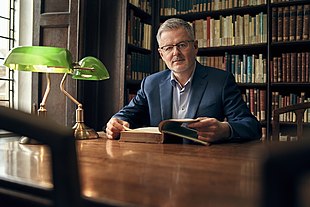
Professor of Modern European History, Cambridge University
Research project:
“Europe and the Beginning of World War I”
Over a long period of time, research has intensively explored the question of the extent to which the political and intellectual climate of the German Empire bore particular responsibility for the escalation of the military conflict and the outbreak of the First World War, or even sought to bring it about. In public events and academic colloquia in Frankfurt and Bad Homburg, Christopher Clark discusses the current state of the debate on the interplay between mentalities and the short-lived consequences of events against the background of his own research findings.
Events:
May 22 – 23, 2014
International conference
Europa 1914. Der Weg ins Unbekannte
With Prof. Dr. Christopher Clark (Cambdrige Unviversity) and others
Location: Goethe University Frankfurt am Main and Forschungskolleg Humanwissenschaften in Bad Homburg v. d. H.
Organizer: Goethe University Frankfurt am Main – Chair of Modern History in cooperation with the Cluster of Excellence “The Formation of Normative Orders”, the Historical College in the Forschungskolleg Humanwissenschaften and other partners
May 26, 2014, 7 pm
Frankfurter Stadtgespräch XV
Who started it? The Sense and Nonsense of Historical Attributions of Guilt
Prof. Dr. Christopher Clark (Cambridge University) in conversation with Prof. Dr. Christoph Cornelißen (Associate Member of the Cluster of Excellence “The Formation of Normative Orders” and Professor of Modern History, Goethe University Frankfurt am Main)
Moderation: Prof. Dr. Klaus Günther (Co-Speaker of the Cluster of Excellence “The Formation of Normative Orders” and Professor of Legal Theory, Criminal Law and Criminal Procedure Law, Goethe University Frankfurt am Main)
Location: Historisches Museum Frankfurt am Main
Organizer: Cluster of Excellence “The Formation of Normative Orders” with the Cultural Office of the City of Frankfurt am Main
29 May 2014, 6 p.m.
Lecture as part of the centenary celebrations of Goethe University Frankfurt am Main
Prof. Dr. Christopher Clark (Cambridge University)
Wilhelminian Germany and the University of Frankfurt: The Context of the War Year
Location: Goethe University Frankfurt am Main, Westend Campus, HZ 1
Organizer: Cluster of Excellence “The Formation of Normative Orders”
-
Biografische Angaben
Christopher Clark is a joint Fellow of the Cluster of Excellence "The Formation of Normative Orders" and the Historical College at the Forschungskolleg Humanwissenschaften at Goethe University Frankfurt am Main. Clark was already a Fellow at the Forschungskolleg in Bad Homburg in 2009 at the invitation of the Cluster of Excellence. Christopher Clark is Professor of Modern European History at St. Catharine's College, Cambridge. One of his main areas of research is the history of Prussia. Born in Australia, he is the author of a biography of Kaiser Wilhelm II. He was awarded the Wolfson Prize in 2007 for his book "Prussia" and in 2010 was the first non-German-speaking historian to receive the Historisches Kolleg München Prize, known as the "German Historians' Prize". For his most recent work "Die Schlafwandler. Wie Europa in den Ersten Weltkrieg zog", Clark received the Bruno Kreisky Prize for the Political Book in spring 2014. -
Publikationen
The Sleepwalkers. How Europe went to War in 1914, Allen Lane, London u. a. 2012 (dt.: Die Schlafwandler. Wie Europa in den Ersten Weltkrieg zog, Deutsche Verlags-Anstalt, München 2013). Kaiser Wilhelm II. A life in power, Penguin, London 2009. Kaiser Wilhelm II, Longman, Harlow u. a. 2000 (dt.: Wilhelm II. Die Herrschaft des letzten deutschen Kaisers. Deutsche Verlags-Anstalt, München 2008). Iron Kingdom. The Rise and Downfall of Prussia, 1600–1947, Allen Lane, London u. a. 2006 (dt.: Preußen. Aufstieg und Niedergang. 1600–1947, Deutsche Verlags-Anstalt, München 2007). The politics of conversion. Missionary Protestantism and the Jews in Prussia, 1728–1941, Clarendon Press, Oxford u. a. 1995.

